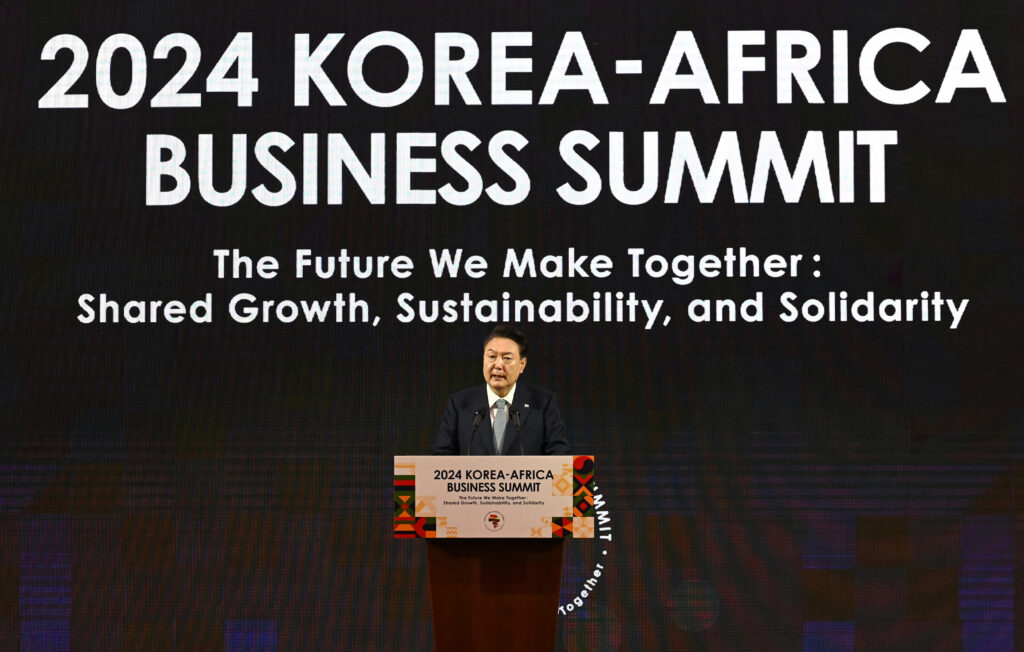Midway through South Korean President Yoon Suk-yeol’s term, the June 2024 Korea–Africa Summit marked a milestone in Yoon’s continuing efforts to strengthen South Korea’s position on the African continent. But South Korea cannot — and should not — view Africa as one mass. An effective approach to the continent will require Seoul to selectively strengthen ties with particular countries where it can advance its interests in mutually beneficial ways.
Among all of South Korea’s African partners, Kenya stands out as a particularly valuable collaborator due to its strategic location in the Indo-Pacific region and its rise within the global semiconductor industry.
Assisting Kenya with the development of its semiconductor industry should be a top priority for South Korea’s Africa strategy. South Korea is well-positioned to leverage its role as a bridge between developing and developed countries, providing Kenya with with much needed help towards becoming a regional technological hub.
Endowed with abundant critical mineral resources, the African continent has become the object of geopolitical competition between the world’s economic powers. By virtue of its location on the Indian Ocean, Kenya also comprises a part of strategic views of the Indo-Pacific by virtue of its location and role as an historic trading hub. Kenya was one of the first places where the modern conception of the ‘free and open Indo-Pacific’ gained traction among Asian policymakers.
South Korea, like China and Japan, has inserted itself into geopolitical competition for influence in Africa and has taken particular steps to shore up ties with Kenya. Early in his presidency, Yoon Suk-yeol met with his Kenyan counterpart William Ruto in Seoul — the first visit by a Kenyan leader to South Korea in over three decades. Kenyan and South Korean officials have held numerous meetings in 2023 and 2024 including on economic cooperation.
As a leader in the global semiconductor industry and an active provider of development aid to African states, South Korea has an opportunity to expand its influence by helping to develop Kenya’s inchoate semiconductor production scene.
Kenya’s rising star in the global semiconductor industry means that Kenya–South Korea cooperation could benefit countries with an interest in a free and open Indo-Pacific. With countries like Japan actively courting Kenya as a geopolitical partner, South Korea would be remiss not to take the opportunity to strengthen ties with Kenya.
Kenya’s ambition to join global semiconductor competition between China and the US-led bloc has manifested with the opening of Semiconductor Technologies Limited at Dedan Kimathi University of Technology. The facility is focused on semiconductior production and research and development, and is the first semiconductor factory in Africa.
Though the facility has not been particularly profitable, Kenyan officials see it as a step toward making Kenya an African semiconductor hub or ‘Silicon Savannah’. US officials have welcomed the establishment of a semiconductor production facility in Kenya as a positive step towards diversifying semiconductor production away from East Asia. The United States has taken steps to cooperate with Semiconductor Technologies Limited as part of a bid to bring Kenya into the fold of Washington’s semiconductor partners.
South Korea, much like Japan, does not have the bandwidth to position itself as a competitor against China in the African continent. But South Korea could take a development-oriented approach towards Kenya’s semiconductor scene for the sake of its broader geopolitical interests.
Kenya’s desire to develop its workforce provides ample opportunities for South Korea to engage in people-to-people educational exchanges with Kenyan citizens. This could include establishing partnerships between academic institutions in Kenya and South Korea. The Korea Advanced Institute for Science and Technology has had some limited collaboration with Kenyan institutions but currently has no international partnerships with institutions in Africa. Exchange programs or joint research initatives between KAIST and Dedan Kimathi University of Technology could be one way to foster cooperation.
Likewise, infrastructure is another potential avenue of cooperation between Kenya and South Korea. Despite the abundance of critical minerals across the African continent, these minerals reserves are largely not commercially viable without further processing. In addition to providing technology to refine minerals, as South Korea has done with other development partners, South Korea will also need to address questions of how such minerals could be brought into Kenya for technology production.
The development of rail and road infrastructure in Africa — a topic that received special attention during the Korea–Africa summit — is critical for South Korea’s interests. South Korea could invest in infrastructure to help bring minerals from other parts of Africa into Kenya, as well as infrastructure to facilitate exports.
China has already seen the benefits of infrastructure investment in Kenya stemming from Nairobi’s efforts to promote the Chinese built deep water port at Lamu to other African trade partners. A South Korean focus on Kenya’s infrastructure development could have far-reaching effects across Africa.
Themed as an effort to promote mutual prosperity, the Korea–Africa Summit underscores South Korea’s ambitions to continue expanding its diplomatic reach beyond its immediate neighbourhood. But no country can devise a strategy designed for an entire continent, much less one as diverse as Africa.
For South Korea to have any chance of successfully executing any strategy towards the continent, it will need to focus first on developing partnerships that can provide the greatest mutual benefit. Kenya stands out as a top partner for South Korea’s economic interests, with South Korea possessing much to offer Kenya in return.
Anthony V Rinna is Senior Editor at the Sino-NK research group.


South Korea's aim of strengthening its position in Africa was on display at the June 2024 Korea-Africa Summit. Kenya, with its strategic location and growing semiconductor industry, is a key partner for South Korea. Kenya's semiconductor ambitions and workforce development goals offer opportunities for technological cooperation and educational exchanges. But infrastructure development is crucial for accessing Africa's critical minerals and facilitating technology production and South Korea faces competition from China, which has already invested heavily in infrastructure in Africa.